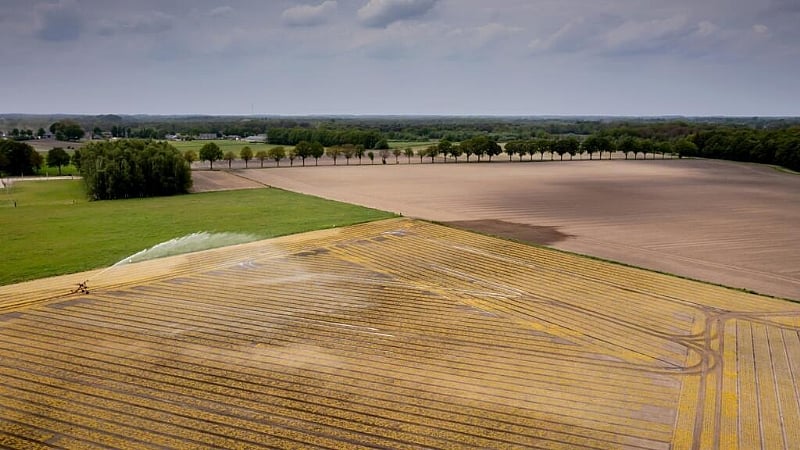The blistering heatwave scorching Europe has inflicted significant damage on agriculture, threatening crop yields and escalating costs for farmers already grappling with economic pressures. From France to Spain and Italy, extreme temperatures have forced unprecedented measures, including fieldwork bans during the hottest hours to protect workers and mitigate fire risks. The soaring mercury, reaching record highs for June in some areas, has disrupted farm operations and placed immense strain on irrigation systems, highlighting the vulnerability of the agricultural sector to climate change. The intense heat, exceeding 39°C in parts of France and surpassing 46°C in Spain and Portugal, has sparked wildfire warnings across southern Europe, further exacerbating the challenges faced by rural communities.
The European potato sector, a crucial component of the continent’s food supply, is facing a particularly precarious situation. The extreme heat threatens to severely impact tuber growth, potentially leading to significantly lower yields and disruptions to harvest schedules. Farmers in key potato-producing regions like Spain, Italy, and southern France are heavily reliant on irrigation to avert crop failure, but the prolonged heatwave is pushing water resources to their limits. Meteorologists warn that if the Mediterranean marine heatwave persists, inland temperatures could remain unstable well into July, compounding the stress on already struggling farms. The potential for reduced potato harvests carries significant implications for food security and market stability.
The heatwave has come at a considerable cost, adding to the existing financial burdens faced by European farmers. Previous droughts and heatwaves have already inflicted an estimated €28 billion in annual losses on EU farms and livestock producers, representing approximately 6% of total agricultural production. Projections indicate that this figure could rise to 10% by 2050 if extreme weather events, as predicted, become more frequent and intense. The compounding effects of climate change are creating a precarious economic landscape for the agricultural sector, demanding urgent adaptation strategies and support measures.
Beyond the agricultural impacts, the heatwave has also placed considerable strain on healthcare systems and infrastructure. Hospitals across Europe, particularly in rural areas, have reported a surge in cases of heat exhaustion and dehydration. Governments have implemented measures to mitigate the effects of extreme heat, including driving restrictions in major cities to combat air pollution and the temporary shutdown of a nuclear plant in France to prevent its cooling system from overheating. Public health advisories urging people to stay indoors during peak heat, hydrate adequately, and check on vulnerable neighbors highlight the widespread impact of the heatwave on daily life.
The challenges faced by farmers are multifaceted, creating a complex and concerning situation. The increased need for irrigation to protect crops clashes with the reduced effectiveness of water absorption by plants under extreme heat conditions, leaving farmers in a difficult predicament. The heatwave also exacerbates pre-existing stresses on water resources, creating further competition for limited supplies. This dual challenge underscores the urgent need for innovative water management strategies and drought-resistant crop varieties to mitigate the impacts of future heatwaves.
The current heatwave serves as a stark reminder of the escalating impact of climate change on our planet. The UN has declared that such extreme heat events are “no longer unusual – it’s the new baseline,” signaling a shift towards a hotter and more volatile climate. Climatologists attribute the “heat dome” phenomenon, trapping hot air over Europe, to the wider trend of longer and more intense heat spells linked to climate change. Dry soils and changing weather patterns further increase the likelihood of future heatwaves, posing a significant threat to agriculture and human health. The anticipated persistence of high temperatures into July raises concerns about the long-term consequences of this heatwave, with lower harvests potentially exacerbating existing economic pressures and food security concerns. The need for urgent and comprehensive climate action is undeniable, requiring global cooperation to mitigate the impacts of climate change and build resilience in vulnerable sectors like agriculture.


